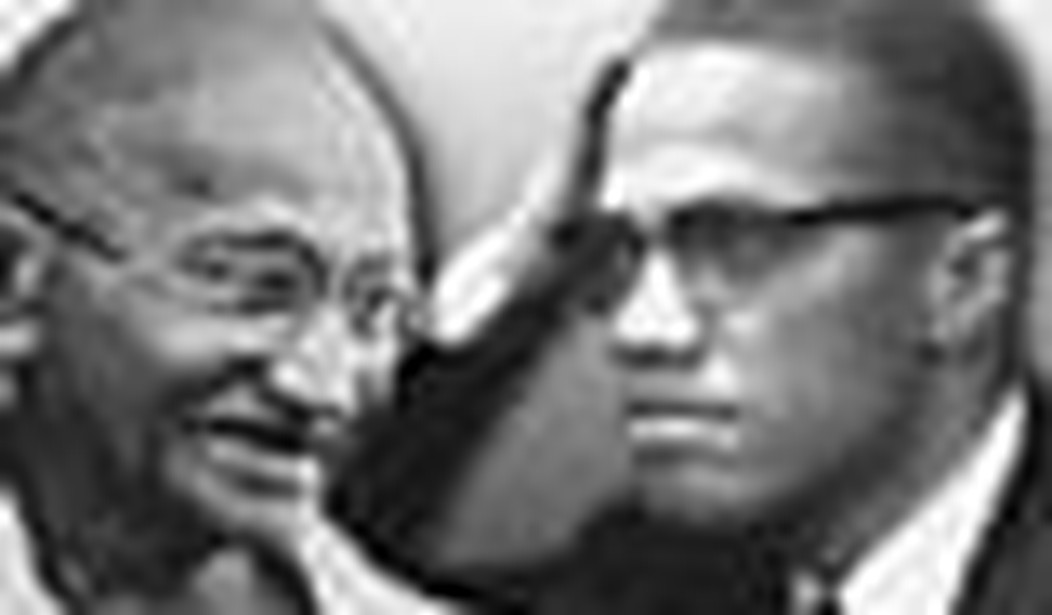Did you hear that ripping sound? Two liberal icons known by their silly stage names — Mahatma Gandhi and Malcolm X — have just been torn down from their sanctified perches thanks to a pair of massively researched but finally damning new biographies.
Both men, it turns out, were at pains to take on phony identities. Each hid his homosexuality, each was racist, each took pains to manufacture favorable coverage, each was driven by petty hatreds instead of shining ideals — each of these supposedly principled figures was an out-and-out phony.
Perhaps the most delicious irony of this myth-busting is that writers with impeccable liberal credentials are the ones who are doing the exposing — and implicitly rebuking the generations of journalists who actively participated in the distortion and exaggeration.
Malcolm X: A Life of Reinvention, by the Columbia scholar Manning Marable, who died just as the book was being sent to stores, shows us a “profoundly flawed individual,” Princeton professor of African-American studies Melissa Harris-Parry told NPR, which called the book “an abrupt departure from ‘heroic’ and ‘perfected’ visions of the African-American minister that were set in motion by The Autobiography of Malcolm X and perpetuated in American popular culture.”
That “autobiography,” as David Remnick makes clear in a review in The New Yorker, consisted in large part of Malcolm Little making up tall tales about his life while being egged on by the sensationalist writer Alex Haley, whose later book Roots would also turn out to be mostly fictitious (and partly plagiarized). Haley, says Marable, wanted to write “a potboiler that would sell,” facts be damned.
Essential to the Malcolm X legend is the “autobiography’s” story that his father was murdered by being laid on railroad tracks by white supremacists. But Malcolm himself said in a 1963 speech that the death was an accident. Haley and Malcolm exaggerated the latter’s youthful criminal behavior to make the later redemption myth more salient. They also painted the young Malcolm as uninterested in politics until his famous prison conversion to the nutty preachings of the Nation of Islam, but in fact Malcolm’s father was a Marcus Garvey devotee who raised his son in the same school of black separatism.
Marable also casts a skeptical eye on the idea that his subject was a loving husband. Malcolm felt forced to marry Betty Sanders for the sake of appearance and the marriage went bad almost immediately. “The main source of our trouble was based on SEX,” Malcolm said in a letter:
She placed a great deal more stress upon it than I was physically capable of doing. . . . One day she told me that we were incompatible sexually because I had never given her any real satisfaction. From then on, try as I may, I began to become very cool toward her.
As for the ultimate source of this tension, Marable reports that Malcolm was probably talking about himself when he told a story about an imaginary friend named “Rudy” who, while serving as a butler to a rich man in Boston, willingly became a male prostitute who would “undress them both, then pick up the old man like a baby, lay him on his bed, then stand over him, and sprinkle him all over with talcum powder. Rudy said the old man would actually reach his climax from that.”
Malcolm X, a hate-spewing charlatan (“Jews run the country,” he said, while women were “tricky, deceitful, untrustworthy flesh” and a plane crash that killed lots of white people was “a very beautiful thing” because “We call on our God — he gets rid of 120 of them”), was always difficult to take seriously, and few fans are likely to remain after reading Marable’s book.
Mohandas Gandhi also successfully hid his homosexuality — his biographer Joseph Lelyveld, former editor of The New York Times, writes in his admiring new book Great Soul: Mahatma Gandhi and His Struggle with India that the Indian leader dumped his wife to have an affair with a German bodybuilder, Hermann Kallenbach. “How completely you have taken possession of my body,” he wrote to Kallenbach. Gandhi even said that Vaseline was “a constant reminder” of his boyfriend.
If Gandhi was not a rabid anti-Semite like Malcolm, his beliefs in regard to Jews are nonetheless reprehensible. He addressed Hitler as “my friend” in a letter and urged that the Jews pursue nonviolent resistance to the Nazis. He also advised the Jews of Palestine to “rely on the goodwill of the Arabs” and wait for a Jewish state “till Arab opinion is ripe for it.”
Gandhi was equally misguided when it came to his own co-religionists, telling fellow Hindus in conflict with Muslims, “I do not mind if each and every one of the 500 families in your area is done to death” as long as they stuck to the idea of passive resistance. He wrote in racist terms about the blacks of South Africa and said the British Empire was an “exact parallel” to the Third Reich.
Why are we startled to learn the real truth about Gandhi and Malcolm? Because journalists are remarkably adept at seeing only what they want to see when a liberal dreamboat comes floating along on a river of lies. We don’t even know exactly what Gandhi told reporters. Lelyveld writes that Gandhi demanded — and journalists granted! — the right to go back over his interview transcripts and edit them heavily. Fittingly enough, a state in India has banned the book. And don’t hold your breath waiting for Hollywood to remake Malcolm X or Gandhi along factual lines.









Join the conversation as a VIP Member